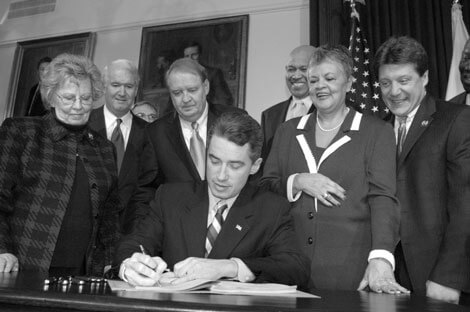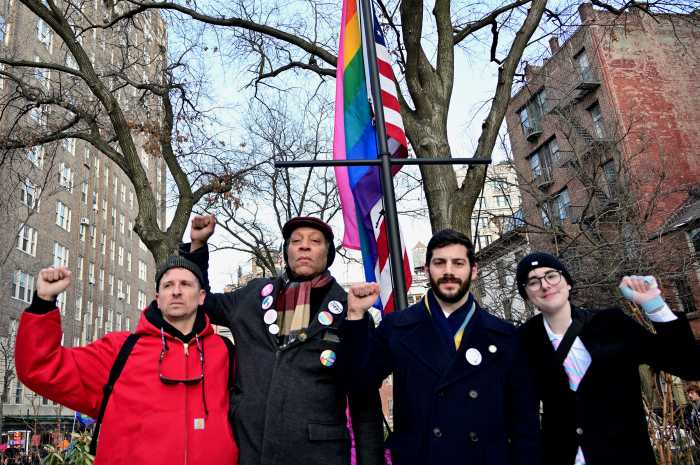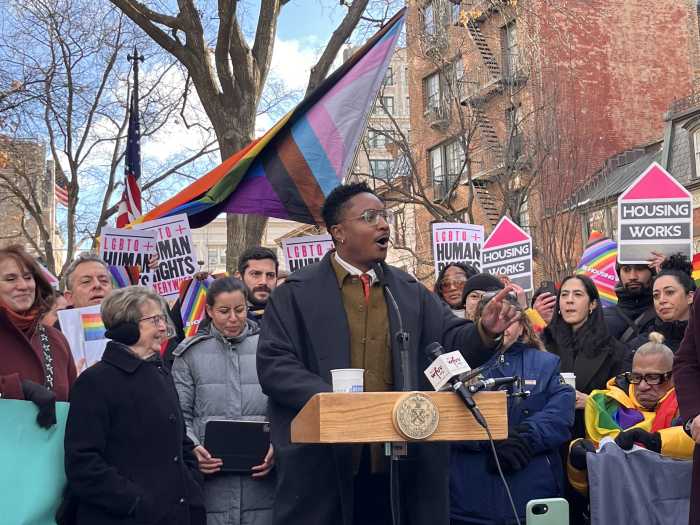New Jersey fifth state to recognize domestic partners
In a public ceremony in Trenton Monday, New Jersey Governor James McGreevey signed the Domestic Partnership Act, making the Garden State only the fifth in the nation to formally recognize in comprehensive fashion the rights of gay and lesbian couples.
The measure cleared the Senate on January 8 by a vote of 23 to 9, after winning approval by the Assembly in December by a narrower margin of 41 to 38. McGreevey had pledged to enact domestic partnership legislation during his 2001 election campaign, and his chief of staff, Jamie Fox, said the measure was the Democratic governor’s most important priority in the lame duck session of the legislature that ended this week.
“The governor’s active involvement was critical, whether you call it arm twisting or using his influence in terms of bringing in members of the Senate one after the other who needed to be brought around,” Fox, who is an out gay man, told Gay City News.
Fox said McGreevey lobbied members of both parties, and the winning tally included 17 Democrats and six Republicans. All nine opposition votes were Republicans, and five members of the GOP and two Democrats abstained. Sen. Sharpe James, the Newark mayor who came under fire from lesbian and gay advocates last year for his halting response to the hate-inspired murder of Sakia Gunn, a 15-year-old lesbian, was absent, though advocates had counted him as a supporter.
The bill is decidedly limited in scope––its major features include hospital visitation and medical decision-making rights, exemption from state inheritance taxes upon a partner’s death, and the right to register a partnership with the state as well procedures for dissolving it. State government employees will be given partnership benefits for lesbian and gay partners equivalent those provided spouses, and municipal governments have the option to offer their employees the same benefits.
There is no requirement that private sector employees offer domestic partner benefits, but insurance companies that provide spousal benefit plans to their employer clients must also offer domestic partner plans. That provision was included in response to the problem that small businesses interested in offering domestic partner benefits encounter finding an insurance carrier willing to set up a program for them. According to Laura Pople, president of the New Jersey Lesbian and Gay Coalition (NJLGC), a statewide volunteer advocacy group that played the lead role in pushing the measure, more than 300 companies in the state, most of them with more than 50 employees, already offer domestic partner benefits.
Unlike the rights afforded by civil unions in Vermont or by the comprehensive domestic partnership law signed in California this past fall by former Governor Gray Davis, the New Jersey law confers no inheritance rights, creates no support obligations or alimony requirements upon a break-up, has no impact on the rights or responsibilities involved in child custody, and creates no legal rights for claims of wrongful death regarding a domestic partner.
In an analysis of existing partnership recognition in the U.S.––civil marriage in Massachusetts, civil unions in Vermont, domestic partnership in California, and reciprocal benefits in Hawaii––Hoftstra University law professor Joanna Grossman, writing in findlaw.com, put New Jersey “roughly in the middle,” and stronger than both Hawaii and the original 1999 California legislation, until it was amended last year.
For gay rights advocates in New Jersey, the law, whatever its limitations, is groundbreaking in codifying state recognition of gay and lesbian couples.
“This is a first step, but an important first step,” Pople said. “We got past the debate about whether same-sex relationships should have any legal recognition, to prove that we are something other than legal strangers.”
“The bill was not as extensive as it could be, but we had to work through the process and decide what we could get,” said Michael Blake, president of the New Jersey Stonewall Democrats. “This is what we’ve been working for for a long time.”
In assessing the contributions made by Trenton politicos, Pople said, “The governor deserves tremendous credit,” and also singled out chief of staff Fox’s work. She named a number of legislator leaders, chief among them Assembly sponsor Loretta Weinberg (D-Teaneck), Assembly Majority Leader Joseph J. Roberts, Jr. (D-Brooklawn), Senate Judiciary chair John Adler (D-Cherry Hill), and Senate Co-President Richard Cody (D-West Orange), who led the drive in the Senate. Assemblymember Bonnie Watson Coleman of Trenton, who is chair of the New Jersey Democratic Party and whose Appropriations Committee began the hearings process on the bill, also played a key role.
Pople also said that the support of the New Jersey Business and Industry Association and more than nearly 200 clergy members statewide––eleven of whom spoke at hearings––was critical in passing the measure.
For his part, Fox said that a series of town meetings sponsored by the bill’s supporters across the state during the past year was also important in winning support in Trenton.
“The public education effort moved a number of legislators,” he said. “There was power in numbers and there were many people at those meetings from all walks of life. That was very important to some legislators, especially in the suburbs, in showing them that we are everywhere.”
NJLGC, in tandem with the Stonewall Democrats, the Log Cabin Republicans, and Lambda Legal Defense and Education Fund, held 13 town meetings across New Jersey during 2003, attracting an estimated 4,000 people and considerable local media attention. The aim was to educate community members, legislators, and the media on the full range of gay family issues, from health and other benefits to marriage. Lambda participated as part of its effort to educate the public on its efforts to win civil marriage rights in the New Jersey courts, dubbing the common effort Supporting All Roads to Justice.
Advocates complemented their year-long public education efforts by putting as human a face on the issue as possible in legislative hearings. When Elizabeth Braun’s partner Sarah Weiss was struck by a drunk driver three years ago, Braun was barred by hospital personnel and Weiss’ family from being by her side when she died. Braun testified about the importance of hospital visitation and medical decision-making rights before an Assembly committee, and afterward told Gay City News, “It was one of the most difficult things I have done in my life.” She hastened to add, however, that the bill’s success “empowered” her.
In addition to gay and lesbian couples, the new law also extends domestic partner benefits to heterosexual couples 62 and older, on the theory that widowed seniors are often unwilling to risk losing pensions by remarrying. The age distinction has given an opening for a court challenge to the League of American Families, which opposes the new law because it sees it as a step toward gay marriage. Its executive director, John Tomicki, has said his group will challenge the requirement that heterosexual couples be 62 or older as impermissible age discrimination.
George DeCarlo, a Green Party member who ran unsuccessfully for the Assembly last year and one of the few gay critics of the new legislation, faulted the law for what he also views as age discrimination. He has also expressed concern that news of the new law will confuse New Jersey lesbians and gay men into thinking that they have won more rights than they have.
Although the bill’s advocates concede that more could be done, there are no specific plans for additional partnership legislation at this time. Fox said that while the governor retains an open mind, advocates have not yet broached next steps with his office.
One point that Fox made clear, however, is McGreevey’s continued opposition to gay marriage. That posture puts him at odds with Lambda, which filed its civil marriage lawsuit on behalf of seven lesbian and gay couples in June 2002. Though the case was dismissed at the district level in early November, Lambda has filed an appeal and views the New Jersey judiciary––a strong supporter of gay rights on issues from co-parent adoption to James Dale’s challenge to the Boy Scouts of America––as a promising venue. The group’s legal challenge is based on the state Constitution’s guarantee of the right to privacy that courts have ruled includes the right to marry and its guarantee of equal protection.



































